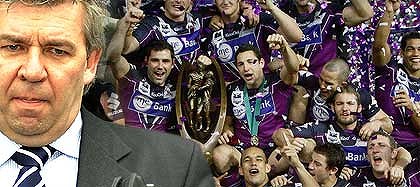Joel Cosgrove, June 2010
Much has been written about the Melbourne Storm and their repeated breaching of the salary cap. Although there has been much comment on the issue, the vast majority has been shallow and generally misses some pretty obvious points.
To recap. The Australian National Rugby League (NRL) has a salary cap, the cap for 2010 is AU$4.69 million for the 25 highest paid players at each club. The Storm from 2006-10 breached the cap by at least AU$1.85 million in a process that involved two sets of financial accounts, a calculated fraud. The scandal came out when an insider at the club notified the NRL who then acted on the systemic breach.
Newstalk ZB talkback host Murray Deaker, talking on his show, made the point that the Storm breaching the salary cap was not an oddity; it is a process at the centre of things. Since 1991 there have been at least 50 instances of clubs being fined for serious or minor breaches of the cap. Deaker raised the point further by saying that the salary cap scandal was comparable to the recent financial crisis, in that greed is at the centre of things and that when you commercialise something greed becomes a part of it.
On the surface, it might appear that it is a few greedy people taking advantage of the majority of hard-honest toilers. But that is the basis of capitalism. It is not a matter of chance or fairness but a reflection on the wider system.
Historically league came out of a schism between different teams in England, those who agreed to “broken time payments” i.e. paying players to cover lost wages. From that point League and Rugby Union have operated along crude class lines. League paid their players and Union didn’t. The French Union had a patchy record in terms of amateurism, funny enough in world war two in Occupied-France league was banned and union was allowed.
Chris Rattue writing in the New Zealand Herald stated, “So widespread were illegal player payments that the first three [Union] World Cups – with New Zealand and Australia winning two of them – could be regarded as invalid. “ Other commentators have talked in terms of rugby getting its own back on league.
League as a sport does not exist in isolation from other sports or society in general. While league might not be a major sport in more than a few countries. The players are potentially able to move between codes, as well as the all important fight for viewers and sponsors. In the past League has poached Union players with the promise of upfront pay instead of shady deals to work within the amateur ethos of Union.
Deaker spoke about the fairness of the NRL competition as opposed to the two-horse race English premiership in which Billionaire Roman Abramovich has spent more than half a million dollars on Chelsea Football Club and Manchester United who currently sit on almost one and a half billion dollars of debt. The reality of sport within capitalism is that money to a large extent rules. If the English premier league placed a salary cap on its clubs then the players and capital could move elsewhere, as football is a truly global game and attempts by groups or countries to control the system would fail. League is not a global game and can institute rules that globalised sports cannot. What Deaker sees as greed is capitalism and fairness is actually the need for the working class, the majority being done over by the greedy minority to take control of their sport from an intrinsically greedy and destructive system. Capitalism.

Just another WordPress site
